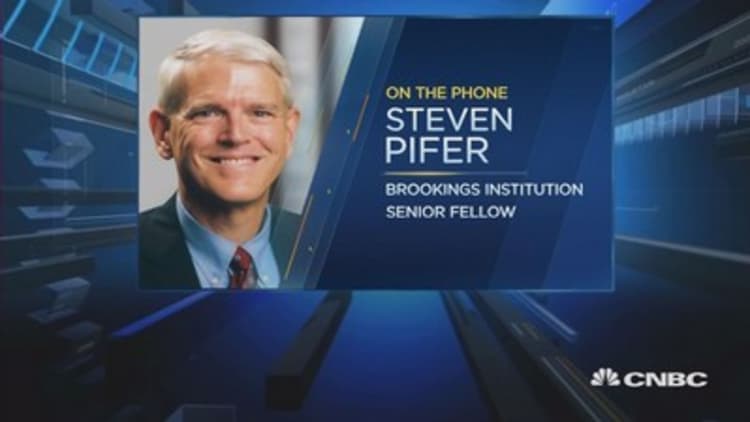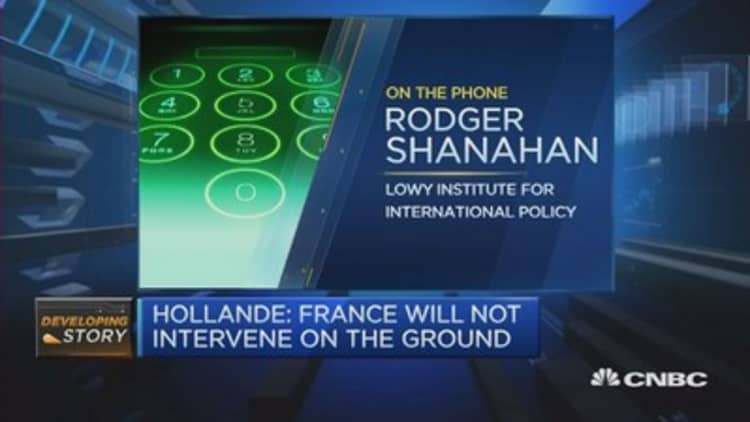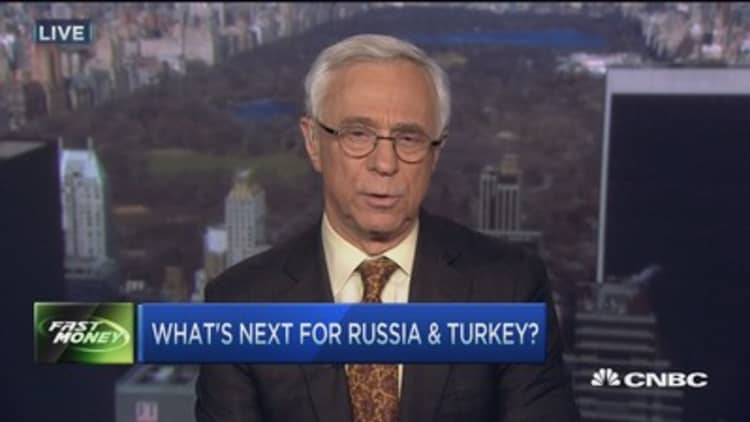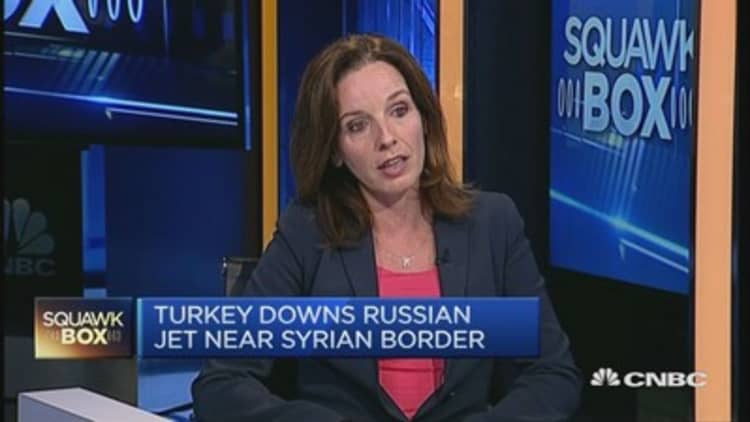


The foreign ministers of Russia and Turkey have spoken to each other about Tuesday's downing of the Russian military jet, deciding to meet in the coming days to discuss the situation on Turkey's border with Syria.
Describing the shooting down of the jet Tuesday as a "planned act", Russia's Sergey Lavrov said the incident could not go without reaction, according to news wires.
Turkish Foreign Minister Mevlut Cavusoglu spoke by phone with Russian counterpart Sergei Lavrov on Wednesday, agreeing to meet in the coming days, a Turkish foreign ministry spokesman told Reuters.
"In their discussion, agreement was reached to share details on the matter via diplomatic and military channels," spokesman Tanju Bilgic said in an e-mailed statement seen by Reuters.
News of the conversation came after Russia announced it was planning to strengthen its military base in Syria by installing an air defense system in Syria and vowed to continue airstrikes near Turkey's border.
Russia's decision to continue risky operations close to the Syria-Turkey border, reportedly on rebel groups who oppose Syrian President Bashar Assad, comes despite the downing of one of its warplanes by Turkey on Tuesday.
Russian President Vladimir Putin slammed Turkey's actions, which led to the death of one of the Russian pilots, and said Moscow would send an S-400 air defense system to a Russian airbase in Syria "to ensure the safety of our flights."
Despite the SU-24 fighter jet being shot down on the Turkey-Syria border, Kremlin spokesman Dmitry Peskov said the country would continue airstrikes near the Turkish border, Reuters reported.
The SU-24 warplane downed Tuesday was believed to have been targeting an anti-Assad rebel group, which is supported by Turkey.
"We would like for the terrorists and militants to keep further away from the Turkish border, but unfortunately they tend to be situated on the Syrian territory close to the Turkish border," Peskov told journalists on a conference call.
The latest comments from Putin come amid a war of words between Turkey and Russia with Turkey's prime minister reiterating earlier comments from Turkish President Tayyip Erdogan that Turkey wouldn't hesitate to defend itself.
Erdogan had tried to calm tensions between Turkey and Russia on Wednesday, saying Turkey did not want any escalation after it shot down the Russian fighter jet, but said Turkey had acted simply to defend its own security and the "rights of our brothers" in Syria.
Speaking at business event in Istanbul, Erdogan said the jet had been fired at while in Turkish airspace but had crashed inside Syria, although some parts of the plane landed in Turkey and injured two Turkish citizens.
Earlier, the U.S. said it believed that the Russian jet shot down by Turkey on Tuesday was hit inside Syrian airspace after a brief incursion into Turkish airspace, a U.S. official told Reuters, speaking on condition of anonymity.
The official said that assessment was based on detection of the heat signature of the jet.
Following Erdogan's comments on Wednesday, Putin also slammed Turkey's leadership, saying it deliberately supported the "Islamisation" of its country, according to Russian news agency Interfax.
The White House said that U.S. President Barack Obama and Erdogan spoke by phone on Tuesday about the need to de-escalate tensions with Russia.
Obama expressed "U.S. and NATO support for Turkey's right to defend its sovereignty," the White House said in a statement.
"The leaders agreed on the importance of de-escalating the situation and pursuing arrangements to ensure that such incidents do not happen again," the statement said.
U.N. Secretary-General Ban Ki-moon also appealed to Turkey and Russia to reduce tensions.
Ban hopes "a credible and thorough review will clarify the events and help prevent future recurrences," U.N. spokesman Stephane Dujarric said.
"He urges all those who are engaged in military activities in Syria, especially air campaigns, to maximize operational measures to avoid unintended consequences," Dujarric said.
Turkey shot down the Russian warplane near the Syrian border, saying the jet had violated its airspace, in one of the most serious publicly acknowledged clashes between a NATO member country and Russia for half a century.
But Putin said the plane had been attacked when it was 1 km (0.62 mile) inside Syria and warned of "serious consequences" for what he termed a stab in the back administered by "the accomplices of terrorists".
"We will never tolerate such crimes like the one committed today," Putin said.

In a letter to the U.N. Security Council, Turkish U.N. Ambassador Halit Cevik said two planes approached Turkish airspace on Tuesday morning and were warned 10 times in five minutes to change direction.
Cevik said both planes then flew more than a mile into Turkey for 17 seconds. He said the nationality of the planes was unknown.
Meanwhile, the Turkish President said in a speech in Ankara: "Nobody should doubt that we made our best efforts to avoid this latest incident. But everyone should respect the right of Turkey to defend its borders."
In condemnation of Russian air strikes in Syria, during which Turkish air space has been violated several times in recent weeks, Erdogan said that only Turkey's "cool-headedness" had prevented worse incidents in the past.
Reuters contributed to this story.



